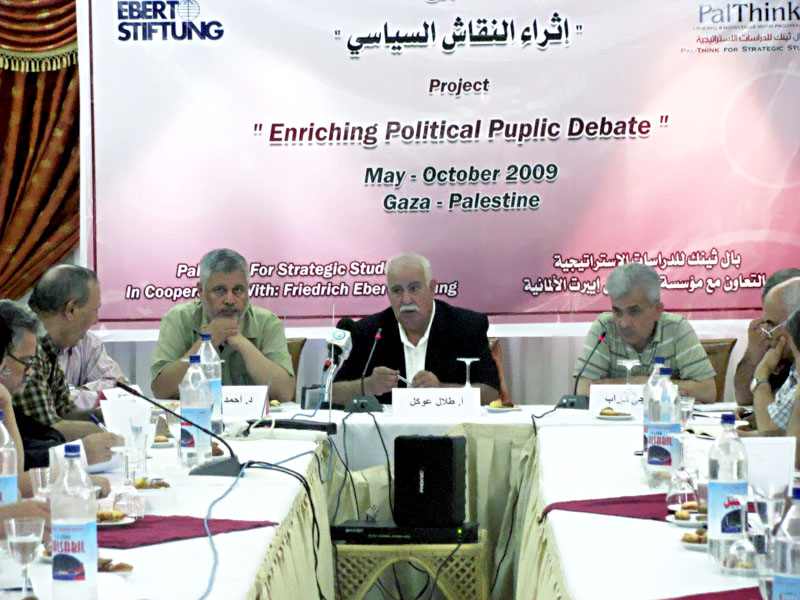Gaza-Saturday, 11 July, 2009 Pal think for Strategic Studies, in cooperation with the Friedrich Ebert foundation, organized a third workshop within the “Enriching Political Public Debate” project. The workshop was attended by a number of economists, politicians, researchers and intellectuals. The workshop presented two working papers the first was entitled” The New U.S Administration will it Bring Fundamental Change to its Middle East Policy”, the second was entitled “Turkey: New Role for an Old Player,” the discussion meeting was moderated by Mr.Talal Okal ,Political Analyst.
 Mr. Omar Shaban president of Pal Think for Strategic Studies, opened the meeting with a speech on the necessity of stimulating strategic thinking when discussing the core issues, he pointed to the role of pal think in stimulating debate on key issues in order to deliver messages to decision makers. Mr. Shaban also assured the importance for the Palestinians and Arabs to bypass the disagreements and move forward towards a unified position regarding regional and international change, he warned of the danger of the Palestinian internal division; which negatively affects the opportunity for Palestinians to regain their rights or ever to negotiate under the state of division.
Mr. Omar Shaban president of Pal Think for Strategic Studies, opened the meeting with a speech on the necessity of stimulating strategic thinking when discussing the core issues, he pointed to the role of pal think in stimulating debate on key issues in order to deliver messages to decision makers. Mr. Shaban also assured the importance for the Palestinians and Arabs to bypass the disagreements and move forward towards a unified position regarding regional and international change, he warned of the danger of the Palestinian internal division; which negatively affects the opportunity for Palestinians to regain their rights or ever to negotiate under the state of division.
For his part, Dr. Osama Antar, Friedrich Ebert’s programs manager in the Gaza Strip, highlighted the role of research centers in creating basic ideas and discussing them in depth, he stressed the need to implement the recommendations; otherwise they will be no more than ink on paper.
Dr.Naji Shurab, a professor of political science at Al Azhar University, presented the first paper entitled ” The New U.S administration, will it Bring Fundamental Change to its Middle East,” pointing out the political denotation of the victory of president Obama, stressing that the American policy and its role in the peace process in the Middle East and the settlement of the Arab –Israeli conflict.
Dr.Naji also stated that the priorities of the American policy are to ensure access to Arab oil without threats or hindrance, to prevent any growing regional power that could threaten this goal and to ensure the safety and survival of Israel.
Shurab assessed in his presentation, the prospects of peace under the new U.S administration and the balance of the political position, in addition to direct pressure on Israel to abide by the two –state solution and stop settlement.
Dr. Ahmed Yusif, undersecretary of the ministry of Foreign Affairs and former adviser to prime minister, Ismail Haniyeh, presented his paper entitled “Turkey: New Role for an Old Player,” he assured that leaders and caders of the Justice and Development party present an ambitious Turkish generation, which is expected to actively engage the role of Turkey in the region.
Dr.Yusif indicated that everyone at this time is embarking upon a new strategy to raise the level of democracy; by externally formulating foreign policy positions, to qualify turkey to play more active roles in the international political system in the near future.
Dr.Yusif added that turkey today is working with all its power to end the crisis and historical hostility with surrounding countries and to end its isolation by communicating with its western and European dimensions.
In closing, a door for debate and intervention was opened for participants.
The majority of respondents were critical of either Turkey or the new U.S administration affecting change in the region.

